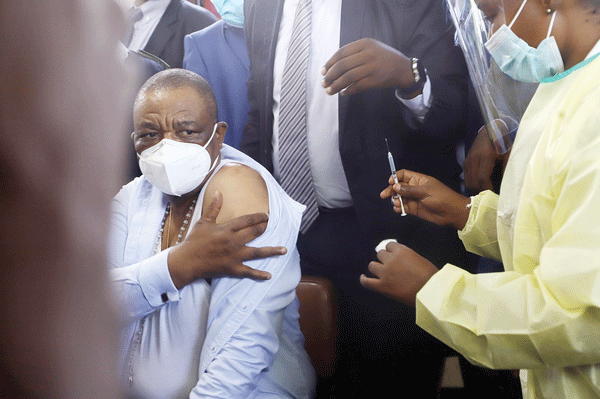
by RICHARD MUPONDE/MIRRIAM MANGWAYA/BEAUTY NYUKE
PRESIDENT Emmerson Mnangagwa has announced a coterie of punitive measures designed to coerce citizens to undergo COVID-19 vaccination following a low uptake of the jab since the launch of the programme on Thursday last week.
Addressing villagers in Nyamandlovu in Bulawayo on Thursday where he officiated at the ground-breaking ceremony for the Zambezi Water Project pipeline at Epping Forest pumpstation, Mnangagwa warned of a tough time ahead for those who refuse to be vaccinated.
He said there was no reason why people should refuse to be vaccinated, but maintained that the immunisation programme was voluntary.
“You are not forced to be vaccinated, but time shall come when those who are not vaccinated won’t get jobs and won’t be able to board Zupco buses. So you have to see what you can do now, the vaccines are free,” he said.
After Mnangagwa’s threats, presidential spokesperson George Charamba posted on his @Jamwanda2 Twitter handle urging citizens who resist vaccination to be prepared to face the trade-off.
“Testing strong snuff by nostrils: Well, there you have it folks! The President of Zimbabwe, Cde ED Mnangagwa, today broke his silence on whether or not the COVID-19 vaccination remains voluntary forever” Charamba tweeted.
“Those wishing to abstain from the vaccination programme are free to do so for as long as they accept the onerous trade-off: namely that they may have to be barred from public spaces, including accessing offices, shops or riding on mass transits like Zupco.”
- Chamisa under fire over US$120K donation
- Mavhunga puts DeMbare into Chibuku quarterfinals
- Pension funds bet on Cabora Bassa oilfields
- Councils defy govt fire tender directive
Keep Reading
He said Mnangagwa instilled confidence in the public by inviting his deputy Constantino Chiwenga, who is Health minister, to become the first Zimbabwean to be inoculated.
“The President invited Vice-President up as proof that the Sinopharm vaccine was indeed safe. Vice-President Chiwenga commissioned the vaccination programme by taking the first jab himself last week.
“Many medical staff, themselves the core frontline in the fight against COVID-19, have been vaccinated under the programme which is wholly government-funded and is meant to get Zimbabwe back to normalcy,” he said.
Earlier in the week, Charamba had hinted on mandatory vaccination.
Human rights groups and medical doctors yesterday said Mnangagwa’s call for all citizens to participate in the vaccination programme was noble, adding that government needs to ramp up its information dissemination programme to increase uptake of the drug.
Zimbabwe Human Rights NGO Forum executive director Musa Kika said the President’s declaration was a balancing exercise to enhance proper management of the Public Health Act in fighting COVID-19.
“Those who are not interested in getting vaccinated should be ready to face the consequences,” Kika said.
“As much as everyone must enjoy their rights, they are limited by section 86 of the Constitution. Rights of individuals should not infringe those of others. Sometimes setting out conditions was reasonable as it was meant to encourage citizens to get vaccinated.”
He said what Mnangagwa outlined was likely to be replicated in other countries, with some countries likely to stop unvaccinated immigrants into their territories.
Medical and Dental Private Practitioner Association of Zimbabwe acting president Johannes Marisa also advocated for compulsory vaccination, arguing that if a greater population remained unvaccinated, efforts to curb the spread of the virus will be in vain.
“What is ideally needed is for the majority to get vaccinated against COVID-19 like any other diseases as with immunisation,” he said.
“To achieve a high vaccination uptake rate following conspiracy theories which went viral on social media, we have to make sure that it is somehow mandatory. If we can’t achieve the 70% vaccinating target, it means that we are in trouble. We cannot get protection from the COVID-19 because the virus will still roam around us.”
He added that vaccinating a small population was a waste of resources because the remaining majority will still be exposed to the virus.
Zimbabwe Nurses Association president Enock Dongo, who early this week said lack of adequate information was fuelling resistance to vaccination, said: “We are still looking at it using our structures to decide how best we can respond.”
Community Working Group on Health executive director Itai Rusike said if government was considering mandatory COVID-19 vaccination for frontline workers, it should be guided by the Public Health Act.
The Public Health Act provides for compulsory immunisation of children and incapacitated persons where there are compelling reasons of public health.
“What the government should do is to provide the frontline health workers and the people of Zimbabwe the options to choose the vaccine brands of their choice instead of foisting the Chinese Sinopharm vaccine to everyone,” Rusike said.
- Follow us on Twitter @newsdayzimbabwe











